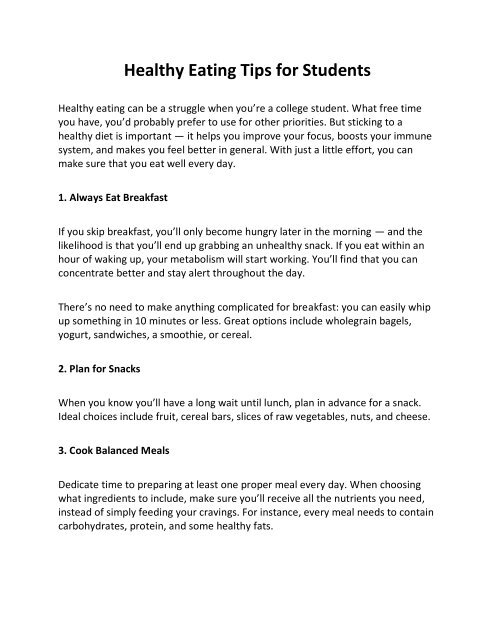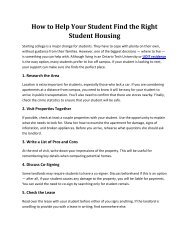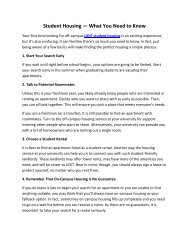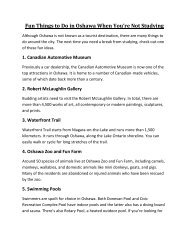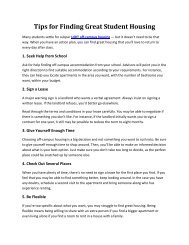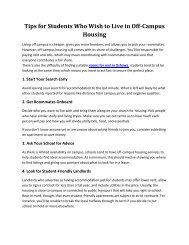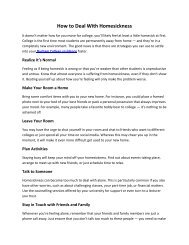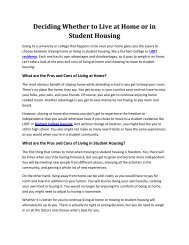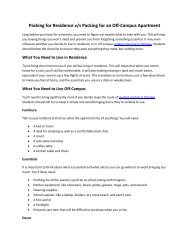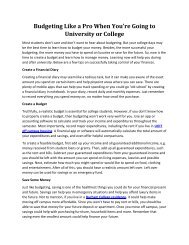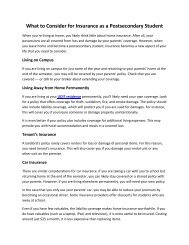Healthy Eating Tips for Students
Follow the provided tips to keep your diet healthy when you are studying away from home. Eating healthy can be a struggle for college students.
Follow the provided tips to keep your diet healthy when you are studying away from home. Eating healthy can be a struggle for college students.
You also want an ePaper? Increase the reach of your titles
YUMPU automatically turns print PDFs into web optimized ePapers that Google loves.
<strong>Healthy</strong> <strong>Eating</strong> <strong>Tips</strong> <strong>for</strong> <strong>Students</strong><br />
<strong>Healthy</strong> eating can be a struggle when you’re a college student. What free time<br />
you have, you’d probably prefer to use <strong>for</strong> other priorities. But sticking to a<br />
healthy diet is important — it helps you improve your focus, boosts your immune<br />
system, and makes you feel better in general. With just a little ef<strong>for</strong>t, you can<br />
make sure that you eat well every day.<br />
1. Always Eat Breakfast<br />
If you skip breakfast, you’ll only become hungry later in the morning — and the<br />
likelihood is that you’ll end up grabbing an unhealthy snack. If you eat within an<br />
hour of waking up, your metabolism will start working. You’ll find that you can<br />
concentrate better and stay alert throughout the day.<br />
There’s no need to make anything complicated <strong>for</strong> breakfast: you can easily whip<br />
up something in 10 minutes or less. Great options include wholegrain bagels,<br />
yogurt, sandwiches, a smoothie, or cereal.<br />
2. Plan <strong>for</strong> Snacks<br />
When you know you’ll have a long wait until lunch, plan in advance <strong>for</strong> a snack.<br />
Ideal choices include fruit, cereal bars, slices of raw vegetables, nuts, and cheese.<br />
3. Cook Balanced Meals<br />
Dedicate time to preparing at least one proper meal every day. When choosing<br />
what ingredients to include, make sure you’ll receive all the nutrients you need,<br />
instead of simply feeding your cravings. For instance, every meal needs to contain<br />
carbohydrates, protein, and some healthy fats.
4. Look Up Recipes<br />
If you’re not used to cooking, you can learn the basics by following simple recipes.<br />
Search online <strong>for</strong> healthy recipes that don’t seem too complicated to follow.<br />
5. Pay Attention to What You Drink<br />
Avoid purchasing drinks whenever possible and drink water instead. Even fruit<br />
juice can increase your intake of sugar significantly. Also try to cut down on<br />
alcohol and brew your own coffee instead of purchasing fancy caffeinated drinks,<br />
which are often sweetened with syrup.<br />
6. Prepare <strong>for</strong> Late-Night Hunger<br />
When you’re studying late at night, you may become hungry. It’s fine to eat small<br />
amounts to keep your brain fueled, but snacks must be low in sugar, salt, and fat.<br />
It’s hard to prepare healthy meals if you lack a kitchen. Facilities tend to be<br />
limited on campus, meaning most students resort to relying on less-than-ideal<br />
meal plans. A much better option is to look <strong>for</strong> rooms <strong>for</strong> rent in Oshawa that<br />
come with a kitchen. For Durham College off-campus housing, there’s Village<br />
Suites Oshawa. You’ll receive a suite that has a kitchen shared with no more than<br />
four other people.


